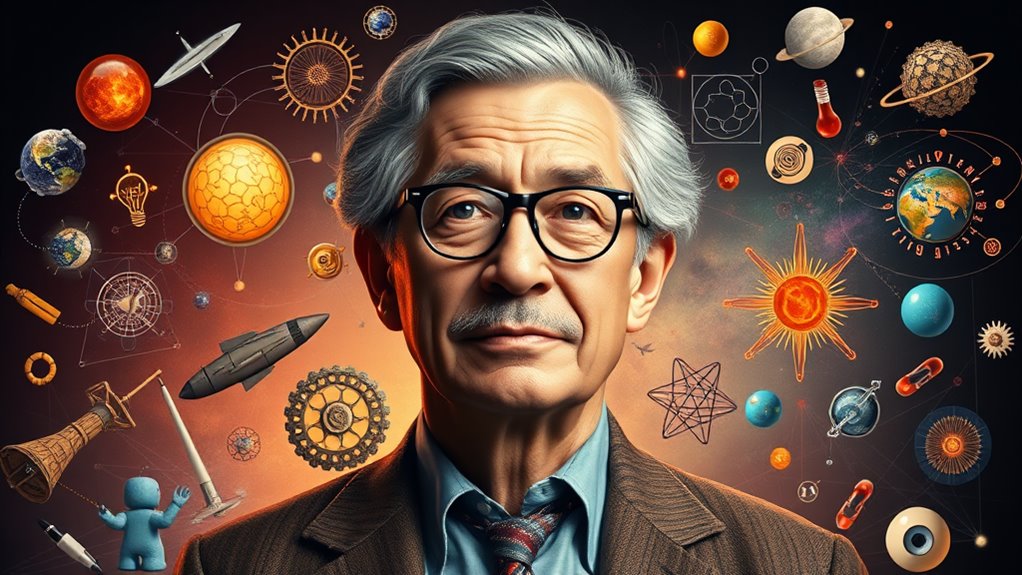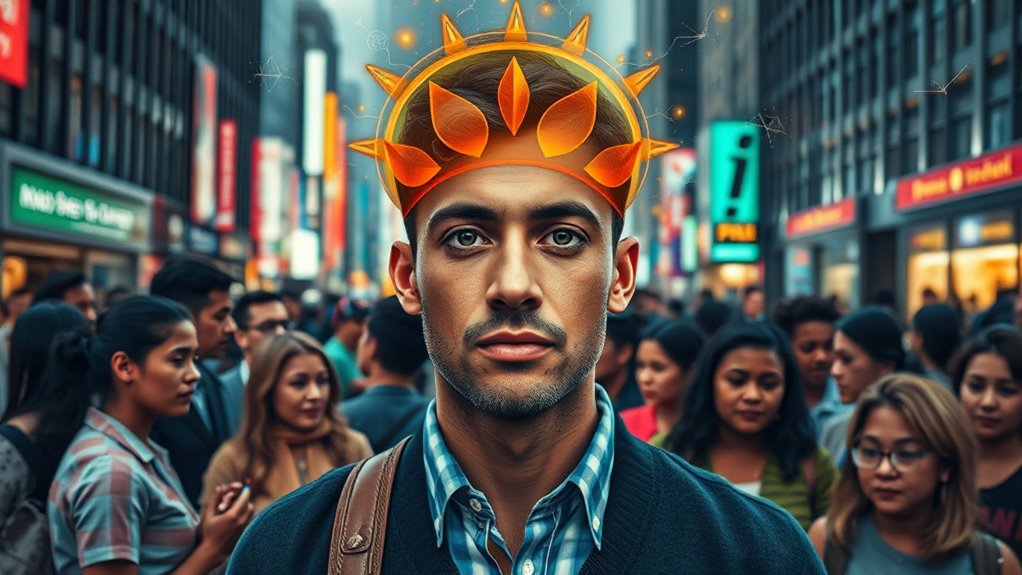The title of the smartest person alive often goes to YoungHoon Kim, boasting an incredible verified IQ of 276. This score highlights his exceptional cognitive abilities, far surpassing the average IQ of 100. Kim has made significant contributions to intelligence advocacy and serves as an advisor at prestigious memory competitions. His high IQ not only sets him apart but also raises intriguing questions about intelligence and its impact on society. If you're curious about other high-IQ individuals and the fascinating world of intelligence, there's more to discover about the achievements and challenges they face.
Essential Insights
- The highest verified IQ score is held by YoungHoon Kim at 276, making him one of the smartest individuals alive today.
- Kim Ung-Yong, known for his extraordinary abilities, has a recorded IQ of 210 and showcases exceptional talents from a young age.
- High IQ individuals often contribute significantly to fields like science, literature, and philosophy, influencing societal perceptions of intelligence.
- Organizations like the United Sigma Intelligence Association include individuals with high IQs, promoting intellectual mentorship and collaboration.
- Intelligence is complex and can fluctuate due to various factors, making definitive rankings challenging.
Highest Recorded IQ Scores

When it comes to measuring intelligence, the highest recorded IQ scores often grab attention for their astonishing numbers. These extreme intelligence figures, like the reported 210 for Kim Ung-Yong, can spark curiosity about the nature of cognitive variability. While the average IQ score is set at 100, scores above this threshold indicate above-average cognitive abilities.
IQ tests measure both fluid and crystallized intelligence, which involves different cognitive skills. The scores are standardized and distributed on a bell curve, meaning most people fall within 15 points of the average. Additionally, IQ can change due to factors like education and environment, which further complicates the interpretation of a single score.
However, it's important to recognize that IQ tests have their limitations. Many critics argue that these scores don't accurately reflect a person's overall intelligence. Cultural factors considerably influence IQ test outcomes, and there's no single measure that encapsulates general intelligence. Different cognitive abilities are linked to various brain circuits, making it difficult to gauge someone's potential through a single number.
Furthermore, while high IQ scores can impress, they don't guarantee success or indicate how well someone can navigate real-world challenges. Often, those with extreme intelligence face unique hurdles that can affect personal development.
It's vital to view IQ scores within a broader context, acknowledging the complex nature of intelligence and the various ways it can manifest, rather than relying solely on a number that may not capture the full picture.
Notable High IQ Individuals

High IQ individuals often stand out not just for their extraordinary scores but for their remarkable achievements across various fields. You might be surprised to learn about some of these gifted individuals whose cognitive abilities have led them to accomplish great feats. Here are a few notable examples:
- YoungHoon Kim: A member of the Giga Society, he boasts an astonishing IQ of 276 and serves as an intelligence specialist advisor for international mind sports.
- Kim Ung-Yong: With an IQ of 210, he solved complex math problems at age 4 and was fluent in four languages by age 5. He later worked for NASA and became a professor.
- Michael Kearney: This prodigy graduated college at just 10 years old and earned a PhD in chemistry by age 22, showcasing extraordinary academic prowess.
- Early Academic Achievements: Many high IQ individuals exhibit exceptional talents from a young age, often mastering languages and solving intricate problems well before their peers. These individuals often benefit from educational experiences, which can contribute to their cognitive growth and success.
These examples illustrate how high IQ isn't just a number; it can be a powerful predictor of success in various careers.
Whether in medicine, engineering, or academia, the cognitive abilities of these individuals allow them to excel and innovate. Their contributions not only shape their respective fields but also inspire countless others to reach for their own intellectual potential.
Historical Figures of Genius

Historical figures of genius have shaped the course of human knowledge and creativity, leaving legacies that continue to inspire.
Think about Johann Wolfgang von Goethe, who lived during the 18th and 19th centuries. His work in literature and Goethe's Metaphysics laid the groundwork for modern thought. He explored human chemistry and the early theories of evolution, influencing both science and the humanities.
Then there's Leonardo Da Vinci, a quintessential Renaissance man whose innovations spanned art, science, and engineering. Active during the 15th and 16th centuries, he conceptualized flying machines and armored vehicles, pushing the boundaries of what was possible in his time. His masterpieces, like the *Mona Lisa* and *The Last Supper*, still captivate audiences today. Da Vinci's estimated IQ of 200 reflects his extraordinary cognitive abilities.
Galileo Galilei, another giant of the 16th and 17th centuries, made significant contributions to physics and astronomy. He discovered important planetary objects and confirmed the heliocentric model, challenging conventional wisdom and facing severe backlash for it.
Similarly, Isaac Newton revolutionized physics with his laws of motion and universal gravity, while Gottfried Wilhelm Leibnitz introduced calculus, shaping mathematics and philosophy.
These figures didn't just excel in their fields; they redefined them, leaving an indelible mark on society. Their insights and innovations continue to influence contemporary thought, proving that genius transcends time and remains relevant across generations.
Achievements and Contributions

Achievements and contributions of the smartest person alive are nothing short of remarkable. With a staggering IQ score of 276, this individual holds the highest recorded intelligence measure in history. Their impact extends across multiple disciplines, particularly in psychology, neuroscience, and linguistics, showcasing significant cognitive advancements.
As a prominent figure in the intellectual community, they serve as an intelligence specialist advisor for prestigious events like the World Memory Championships and the World Mind Sports Council.
Here are some key highlights of their achievements:
- Founder of the United Sigma Intelligence Association (USIA), which boasts seven Nobel Prize winners among its members.
- President and executive director at USIA, leading initiatives that promote intellectual mentorship and collaboration.
- Verified member of elite high-IQ societies, including the Giga Society and the Mega Society, recognized globally for exceptional intelligence.
- Global recognition for contributions to mental sports and advisory roles in international competitions.
Their relentless pursuit of knowledge and commitment to fostering intellectual growth reflects a passion for advancing human understanding. Additionally, their work parallels that of Albert Einstein, who similarly transformed his field with groundbreaking theories.
Through various leadership roles, they guide the next generation of thinkers and innovators, ensuring that the essence of intellectual mentorship thrives. The legacy of their achievements not only highlights individual brilliance but also serves as an inspiration, encouraging others to push the boundaries of their cognitive capabilities.
Early Prodigies in Intelligence

Throughout history, child prodigies have captivated society with their extraordinary abilities, often drawing attention from both the public and the media. In the early 20th century, tabloids emphasized human interest stories, transforming these gifted youngsters into national celebrities. The media influence fueled public fascination, as people were enthusiastic to learn about the exceptional achievements of young prodigies.
Take Michael Kearney, for example. He graduated high school at just six years old and earned an Associate of Science in Geology by age eight. Kearney's story isn't unique; many prodigies enroll in college early to accelerate their academic pursuits. By the time he turned ten, he'd already obtained a bachelor's degree in anthropology. Such remarkable accomplishments highlight the unique learning needs of child prodigies, often leading them to seek specialized educational opportunities. The rise of child prodigies in the 20th century marked a significant shift in how society perceives and supports gifted children.
However, being a prodigy doesn't come without its challenges. These gifted individuals frequently face immense pressure, which can lead to mental health struggles. While prodigies may exhibit exceptional cognitive capacities, their emotional well-being is essential during these formative years. Society must balance the admiration for their talents with the recognition of their vulnerability.
The media's role in documenting these stories plays a significant part in shaping public perception. By showcasing child prodigies, they not only celebrate their achievements but also raise awareness about the need for support and protection. Understanding these dynamics helps us appreciate the complexities of being a young genius in today's world.
IQ Testing Methodologies

Understanding the extraordinary capabilities of prodigies often leads us to explore how intelligence is measured. IQ testing methodologies play an important role in evaluating cognitive abilities through various test types and scoring methods. These tests have evolved over time, with several prominent examples recognized for their effectiveness.
- Stanford-Binet Intelligence Scale: Measures cognitive factors such as fluid reasoning and knowledge.
- Wechsler Adult Intelligence Scale (WAIS): Evaluates verbal comprehension and processing speed.
- Raven's Progressive Matrices: Focuses on abstract reasoning without cultural bias.
- Woodcock-Johnson Cognitive Ability Test: Assesses abilities across a wide age range.
When it comes to test administration, it's vital to conduct these assessments in controlled environments. This reduces distractions and guarantees accuracy. Different tests may have unique scoring methods, allowing for data merging to provide a comprehensive analysis of cognitive strengths and weaknesses.
Trained professionals administer the tests, adhering to standardized instructions and protocols. Tests can be given in both group and individual settings, accommodating different needs.
Scoring methods vary depending on the test type. For instance, scores may be calculated based on mental age relative to chronological age, with an average set at 100. The WAIS and similar tests often include index scales that provide a more nuanced understanding of cognitive abilities, leading to an all-encompassing Full-Scale IQ score.
Reliability and validity are significant as well, with high test-retest reliability assuring stable scores.
As you explore IQ testing methodologies, you'll find that they offer valuable insights into the complexities of human intelligence.
High-IQ Societies Overview

High-IQ societies serve as exclusive communities where individuals with exceptional cognitive abilities can connect and thrive. These organizations gather people who score considerably higher than average on IQ tests, creating a stimulating intellectual and social environment.
You'll find that the primary goal is to facilitate the exchange of ideas, participate in mentally challenging activities, and contribute to scholarly discussions. Membership offers high IQ benefits, such as networking opportunities with like-minded individuals ranging from young prodigies to seasoned thinkers.
Notable high-IQ societies like Mensa International, Triple Nine Society, and the Prometheus Society have specific membership criteria. For instance, Mensa requires an IQ in the top 2%, while the Triple Nine Society demands an even more exclusive top 0.1%.
Admission typically involves standardized tests administered under professional supervision, with different societies reflecting varying levels of exclusivity.
However, you might face some membership challenges, as each society has its unique criteria and application processes. Once you become a member, you can engage in deep conversations, special interest groups, and activities that challenge your intellect and foster social interactions.
These societies promote a vibrant community focused on intellectual and social improvement, offering you a chance to thrive in a world that appreciates your capabilities.
Fundamentally, high-IQ societies provide a platform where exceptional minds can unite, learn, and grow together.
Global Recognition of Intelligence

Exceptional intelligence often garners global recognition, particularly as individuals like YoungHoon Kim showcase extraordinary IQ scores. With a verified IQ of 276, he not only stands at the top of global intellect lists but also shatters common intelligence myths that often cloud our understanding of cognitive abilities.
His achievements in psychology, neuroscience, and linguistics highlight the cultural perceptions surrounding intelligence, demonstrating that it isn't merely about high scores but also about impactful contributions to society.
Here are some key aspects of global recognition of intelligence:
- Verification by Organizations: Kim's IQ has been confirmed by prestigious bodies like the Korea Record Institute and the Global Genius Registry.
- Membership in High-IQ Societies: His association with societies such as the Giga Society underscores his exceptional standing in the intellectual community.
- International Media Coverage: Various media outlets have highlighted his achievements, further amplifying his global recognition.
- Cultural Contributions: Individuals like Kim enhance our collective understanding of intelligence, challenging prevailing myths that equate high IQ with success or creativity.
As the world evolves, it becomes increasingly important to appreciate the nuances of intelligence.
Recognizing exceptional individuals like YoungHoon Kim allows for a broader conversation about what intelligence means across different cultures, helping to dispel outdated perceptions and celebrate diverse intellectual contributions.
Impact of High IQ on Society

Intelligence can greatly shape societal dynamics, influencing everything from career paths to interpersonal relationships. For individuals with high IQs, this influence often comes with unique social challenges. You might find that your complex thought processes and unique perspectives leave others struggling to engage with your ideas. This can lead to feelings of isolation, as meaningful connections may be hard to come by in a consumerist society that prioritizes surface-level interactions over deep discussions.
In your pursuit of excellence, you're likely to set lofty career goals, but this relentless drive can also result in frustration when expectations aren't met. You might feel the pressures of achieving more, which can manifest in stress and even burnout. Unfortunately, the societal infrastructure often fails to accommodate your exceptional capabilities, leaving you feeling underappreciated.
The intersection of high intelligence and mental health is particularly notable. You may face increased risks of mental health issues due to the strain of high aspirations and the lack of like-minded peers. Research shows that higher IQ levels correlate with moderate or heavy drinking, possibly as a coping mechanism for stress.
Finding appropriate mental health support tailored to your needs can be tough, further complicating your experience. Ultimately, while your intelligence can offer valuable contributions to society, it can also create barriers that complicate your interactions and well-being. It's crucial to navigate these challenges thoughtfully, seeking environments that foster your potential and support your mental health.
Frequently Asked Questions
What Factors Influence the Development of High Intelligence in Individuals?
Several factors influence the development of high intelligence in individuals. Your genetic predisposition plays a significant role, but environmental influences, like educational opportunities and socioeconomic factors, are equally essential.
Engaging in cognitive stimulation and fostering social interactions can enhance your neurobiological development. Furthermore, your motivation levels directly impact your learning capacity.
Are There Limitations to Relying Solely on IQ Scores for Intelligence Assessment?
Yes, there are significant limitations to relying solely on IQ scores for intelligence assessment.
These scores represent only specific intelligence definitions and can be skewed by test biases, favoring certain cultural backgrounds. They don't capture critical skills like creativity or emotional intelligence, and environmental factors can heavily influence results.
Furthermore, without considering a broader range of cognitive abilities, you risk missing out on a complete understanding of an individual's true intelligence.
How Do Cultural Differences Affect IQ Test Results Across Populations?
Imagine a genius in a tuxedo, struggling with a puzzle designed for a Western audience.
It's no surprise cultural biases skew IQ test results across populations. If tests reflect only Western values, their validity plummets, leaving diverse learners at a disadvantage.
You might ace a math problem but stumble over a culturally nuanced question.
Ultimately, these biases lead to misinterpretations of intelligence, reinforcing the need for inclusive assessment tools that respect all backgrounds.
Can Intelligence Increase With Age or Through Specific Training Methods?
Yes, intelligence can increase with age and through specific training methods. Engaging in lifelong learning promotes cognitive enhancement, helping you build your knowledge base and skills.
While some cognitive abilities decline with age, others, like crystallized intelligence, can grow. Practicing cognitive exercises, mindfulness, and even music training can enhance your mental capabilities.
What Role Does Emotional Intelligence Play Alongside Traditional IQ Measures?
Imagine a team leader who navigates conflicts with ease, thanks to their emotional awareness and social skills.
Emotional intelligence plays an essential role alongside traditional IQ measures by enhancing empathy development and cognitive flexibility.
While IQ may help you solve complex problems, it's your EQ that enables you to understand team dynamics, manage stress, and foster collaboration.
Balancing both forms of intelligence is vital for achieving success in both personal and professional relationships.
